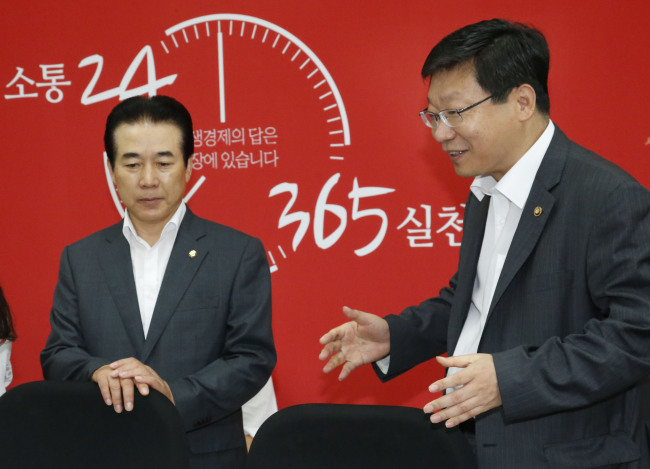Saenuri supports corporate cash reserve taxation plan
By Korea HeraldPublished : Aug. 4, 2014 - 21:32
The government’s plan to impose taxes on corporate cash reserves is necessary but the rate should be lower, the ruling Saenuri Party said Monday.
“The (government’s) idea is to boost investment, and the ruling party does not oppose this,” Rep. Na Seong-lin, vice chairman of the party’s policy committee, told reporters. “However, we do ask (the government) to consider market concerns and minimize the possible side effects.”
He added that the government should “reconsider” the 10-15 percent tax rate, which is to be applied to the companies’ future cash reserves.
“The (government’s) idea is to boost investment, and the ruling party does not oppose this,” Rep. Na Seong-lin, vice chairman of the party’s policy committee, told reporters. “However, we do ask (the government) to consider market concerns and minimize the possible side effects.”
He added that the government should “reconsider” the 10-15 percent tax rate, which is to be applied to the companies’ future cash reserves.

The Ministry of Strategy and Finance and the ruling party held a conference at the National Assembly on Monday to fine-tune the upcoming tax revision bill.
First Vice Minister Joo Hyung-hwan represented the ministry in place of Finance Minister Choi Kyung-hwan.
Choi, who succeeded Hyun Oh-seok in July as finance minister and economic deputy prime minister, suggested that local conglomerates reduce their cash reserves and use the funds to pay out more shareholder dividends and make new investments.
The country’s top five business organizations, headed by the Korea Chamber of Commerce and Industries, claim that the regulations would harm the domestic economy.
“(The cash reserve taxation) is necessary, but the government should be able to persuade the market that the regulation will indeed boost investment,” Rep. Na said.
The lawmaker added it was unlikely that the government would change its decision with the tax law revision so close at hand.
However, the ruling party appeared divided on the revision.
“Companies with heavy cash reserves tend to be top-ranking conglomerates,” said Rep. Rhee In-je. “Should they increase their dividends, the only beneficiaries will be the high-income bracket and foreign investors.”
Related discussions are expected to dominate the parliament’s regular session in September.
The main opposition New Politics Alliance for Democracy earlier said that the cash reserve taxation was double taxation and that it may be replaced by an increased corporate tax.
By Bae Hyun-jung (tellme@heraldcorp.com)
-
Articles by Korea Herald








![[KH Explains] Hyundai's full hybrid edge to pay off amid slow transition to pure EVs](http://res.heraldm.com/phpwas/restmb_idxmake.php?idx=644&simg=/content/image/2024/04/18/20240418050645_0.jpg&u=20240419100350)







![[From the Scene] Monks, Buddhists hail return of remains of Buddhas](http://res.heraldm.com/phpwas/restmb_idxmake.php?idx=652&simg=/content/image/2024/04/19/20240419050617_0.jpg&u=20240419175937)

![[KH Explains] Hyundai's full hybrid edge to pay off amid slow transition to pure EVs](http://res.heraldm.com/phpwas/restmb_idxmake.php?idx=652&simg=/content/image/2024/04/18/20240418050645_0.jpg&u=20240419100350)

![[Today’s K-pop] Illit drops debut single remix](http://res.heraldm.com/phpwas/restmb_idxmake.php?idx=642&simg=/content/image/2024/04/19/20240419050612_0.jpg&u=)